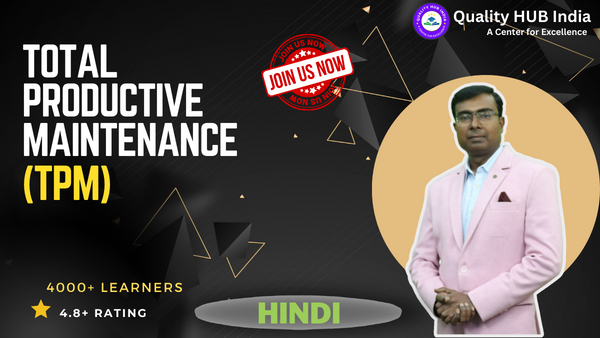There are no items in your cart
Add More
Add More
| Item Details | Price | ||
|---|---|---|---|
Online Training and Certification course on Total Productive Maintenance (TPM) and Basics of Maintenance Management
5.0 (367 ratings)
Language: Hindi & English
Instructors: Dr. Aryan Viswakarma
Validity Period: 365 days
Course: Total Productive Maintenance (TPM) and Basics of Maintenance Management
Course Duration: 9 hrs
Course Objectives
To provide students with the adequate knowledge required to understand and practice the concept of Total Productive Maintenance used in industry.
Prerequisites
It is recommended that all students have the following prior knowledge:
Who Should Attend?
This course is ideal for those who are responsible for product development, operations management, quality control, and engineering including department managers, supervisors, quality representatives, engineers, and administrative staff who have a focus on business improvement, performance, and profitability.
Join Our Weekly Live Doubt-Clearing Sessions
We are committed to your learning success! To ensure clarity and help you achieve your goals, we conduct live doubt-clearing sessions every week.
Why Attend?
Certification Exam Guidelines
Examination Format:
Course Validity & Exam Timeline:
Note: Attempting the exam after the one-year period will require an additional fee.
Certification:
Sample Certificate:
Policy on Cancellation and Refunds
For Technical Support-
Contact us at +91-7988293436 or drop a mail at care@qualityhubindia.com
*Prices may change at any time without prior notice.
REQUEST FOR COURSE VALIDITY EXTENSION
You can also pay by scanning a QR code. Kindly share a screenshot by mail at care@qualityhubindia.com with full details after payment (Name, Email id, Contact No. and Course Name)

Benefits of Doing Courses from Quality HUB India™
Awards & Recognitions
Accreditations & Certifications

2. TPM Basic Fundamentals
3. TPM Benefits
4. Components of TPM
5. TPM Pillars
a. Pillar 1: Autonomous Maintenance
b. Pillar 2: Focused Improvement
c. Pillar 3: Planned Maintenance
d. Pillar 4: Quality Maintenance
e. Pillar 5: Education and Training
f. Pillar 6: Initial Flow Control
g. Pillar 7: Office TPM
h. Pillar 8: Health, Safety, and Environment
6. Types of Maintenance and Maintenance Management
7. Time Based Maintenance VS Condition Based Maintenance
8. Overall Equipment Effectiveness (OEE) and Case Studies
9. Various types of Losses with examples and formula
10. TPM Support Tools 5S, KAIZEN
Additional Resources
After successful purchase, this item would be added to your courses.You can access your courses in the following ways :
